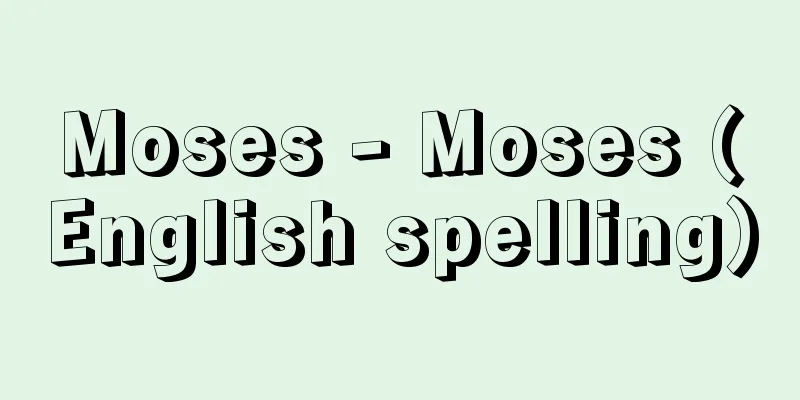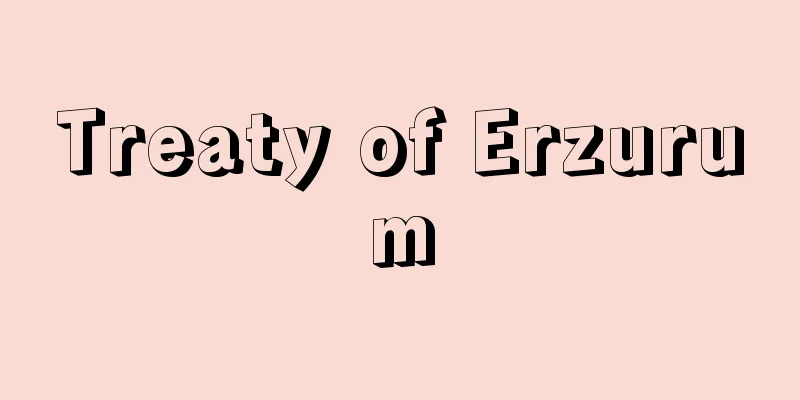Moses - Moses (English spelling)

|
A leader who is said to have established the ancient Israelite people and their religion in the 13th century BC. In Hebrew, he is written as Mōšeh and is also called Moses or Moise. [Kenichi Kida] LifeAround 1280 B.C., the Israelites escaped from Egypt led by Moses, entered into a covenant relationship with God Yahweh at Mount Sinai, and became Yahweh's people. Prior to that, they were merely a collection of tribes called Hebrews who raised small livestock, but by adopting the Yahweh religion, they came to be aware of themselves as one people. During the covenant on Mount Sinai, God gave Moses the Ten Commandments, which the people of Israel were to observe. The Ten Commandments are recorded in almost identical form in Exodus chapter 20 and Deuteronomy chapter 5 in the Old Testament, and are considered important as the foundation of religion and ethics in Judaism and Christianity, including prohibiting the worship of other gods and idols, as well as murder, adultery, and theft. After making a covenant between God Yahweh and Israel on Mount Sinai, Moses wandered in the wilderness for 40 years to help the people obtain the land of Canaan that God had promised to give to their ancestor Abraham. The journey was extremely difficult, and the people often rebelled due to fatigue and hunger, but Moses patiently led them to the Promised Land. It is said that Moses was "meek, more than all the men on earth" (Numbers, Chapter 12). Moses was held responsible for the people's distrust of God during the wilderness journey, and was not allowed to enter the land of Canaan (Numbers, Chapters 14 and 20). He reached the other side of the Jordan, but only saw Canaan from the land of Moab before dying. It is also recorded that the location of his grave remains unknown (Deuteronomy, Chapter 34). [Kenichi Kida] Legend and factThe accounts of Moses range from Exodus to Deuteronomy, and it has long been believed that the Pentateuch (the first five books of the Old Testament, the Torah), which begins with Genesis and ends with Deuteronomy, was written by Moses. However, there are very few definite historical facts known about Moses. The account of Moses' birth and youth in chapters 1 and 2 of Exodus also has a strong heroic legend flavor. However, chapters 3 to 6 of Exodus describe how Moses received a revelation from God and was entrusted with the task of the Exodus, and how he was first informed of the divine name "Yahweh," but this is likely based on historical fact. This is because the great national task of escaping from Egypt and establishing monotheism could not have been accomplished without an outstanding person. Chapters 19 to 40 of Exodus, the entire Book of Leviticus, and chapter 10 of Numbers are about the time when the Israelites stayed on Mount Sinai. In addition to the Ten Commandments, many other laws are recorded here, but most of these are thought to have been collected here by later Jews, who believed that all authoritative laws were given directly by God to Moses on Mount Sinai. The collection and canonization of the law was nearly complete by about 400 BC. In the history of the Israelite people, Moses was gradually idealized and considered the prototype of a prophet and the one who gave all the authoritative laws of Judaism. In the New Testament, Jesus Christ is understood to be the new Moses, and the Sermon on the Mount is understood to be the new Mosaic Law. [Kenichi Kida] "Moses" by Junichi Asano (Iwanami Shinsho) [References] | | |Source: Shogakukan Encyclopedia Nipponica About Encyclopedia Nipponica Information | Legend |
|
紀元前13世紀、古代イスラエル民族とその宗教を基礎づけたと伝えられる指導者。ヘブライ語でMōšehと書き、モーゼまたはモイゼともいう。 [木田献一] 生涯前1280年ごろ、イスラエル民族はモーセに率いられてエジプトから脱出し、シナイ山において神ヤーウェとの契約関係に入り、ヤーウェの民になったという。それ以前はヘブライ人とよばれる小家畜を飼育する諸部族の集合にすぎなかったが、ヤーウェ宗教の受容によって、一つの民族としての自覚をもつに至ったのである。 シナイ山における契約に際して、モーセは神からイスラエルの民が守るべき「十戒」を授かった。十戒は、『旧約聖書』の「出エジプト記」20章と「申命記」5章にほぼ同じ形で記録されており、他神や偶像の礼拝を禁じ、殺人、姦通(かんつう)や窃盗を禁止するなど、ユダヤ教とキリスト教における宗教と倫理の基礎をなすものとして重視されている。 モーセは、シナイ山で神ヤーウェとイスラエルの間に契約を結ばせたあと、神が先祖アブラハムに与えると約束したカナンの土地を民に得させるため、40年間、荒野を放浪した。その旅は困難を極め、疲労と飢えに不満が爆発して民はしばしば反抗したが、彼は忍耐強く統率し、約束の地へ導いていった。モーセは、「そのひととなり柔和なこと、地上のすべての人にまさっていた」(「民数記」12章)といわれている。モーセは荒野の旅において、民が神に対して示した不信の責任を負わされ、自らはカナンの地に入ることを許されず(「民数記」14、20章)、ヨルダンの対岸に達しながら、モアブの地からカナンを眺めるのみで死んだ。彼の墓の所在も知られないままだと記されている(「申命記」34章)。 [木田献一] 伝説と史実モーセに関する記事は「出エジプト記」から「申命記」に及んでおり、古くから「創世記」に始まり「申命記」に終わる「モーセ五書」(『旧約聖書』の最初の五書。律法=トーラー)は、モーセの著作であると信じられてきた。しかしモーセについて知りうる確実な歴史的事実はごくわずかである。「出エジプト記」1~2章にあるモーセの誕生と青年期の記事も、英雄伝説的色彩が濃い。ただ「出エジプト記」3~6章に、モーセが神の啓示を受け、出エジプトの事業を託されたこと、「ヤーウェ」という神名を初めて知らされたことなどが書かれているが、これは歴史的事実に基づくものであろう。エジプト脱出や唯一神教の確立などという民族的大事業は、傑出した人物によらなければ成就しえないからである。「出エジプト記」の19~40章、さらに「レビ記」全体と「民数記」10章までは、イスラエルの民がシナイ山に滞在していた時期についての記事になっている。ここには十戒のほか多くの律法が記されている。しかしこの大部分は、後代のユダヤ教が、すべての権威ある律法はモーセがシナイ山で神から直接与えられたものとするため、ここに集めたものと考えられる。その結集と正典化は紀元前400年ごろには、ほぼ完了した。 モーセはイスラエル民族の歴史のなかで、しだいに理想化され、預言者の原型と考えられ、またユダヤ教のすべての権威ある律法を与えた者とされた。『新約聖書』において、イエス・キリストは新しいモーセであり、山上の垂訓は新しいモーセの律法だと理解されている。 [木田献一] 『浅野順一著『モーセ』(岩波新書)』 [参照項目] | | |出典 小学館 日本大百科全書(ニッポニカ)日本大百科全書(ニッポニカ)について 情報 | 凡例 |
<<: Moseushi [town] - Moseushi
Recommend
Düben (English spelling)
…After the Reformation by Gustav I Vasa, Latin an...
Collection of Old Japanese Guns - Kobun Teppou Zengoshu
A collection of crazy writings from the Edo period...
Orient Express - Orient Express (English name)
A long-distance luxury train that originated in Eu...
Ichigaya Hachiman
...In the early Edo period, Ichigaya village had ...
Vindex
...the peaceful unification of the two was furthe...
Laser processing - Laser beam machining
The process of processing materials using the foc...
Penck, Albrecht
Born: September 25, 1858 in Leipzig [Died] March 9...
on-the-job training
… [Blue-collar training and management] [Seniorit...
Princess Asahi
1543-90 (Tenbun 12-Tensho 18) A woman from the Azu...
Bellori (English spelling) Giovanni Pietro Bellori
Around 1613-96 An Italian art theorist of the Baro...
Balinese
(See table.) Malay has inscriptions from the end ...
Capillary action - Moukangensho
This phenomenon occurs when a thin tube is placed...
First fruits - Hatsuho
In agricultural ceremonies, the first grain harve...
Demetrius I
187 - 150 King of Syria. Reigned 162-150 BC. Secon...
Tariff autonomy
It refers to the right of a nation to independent...









